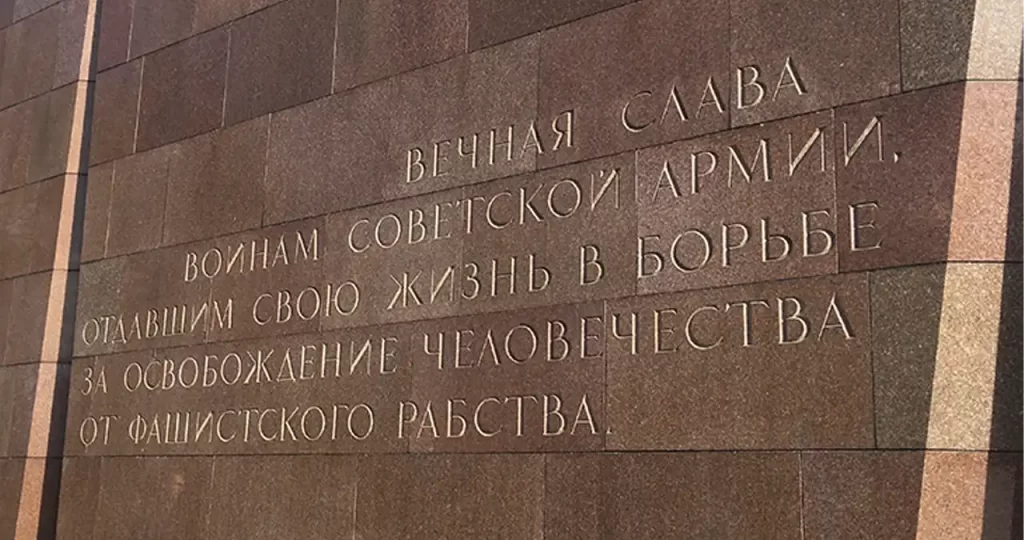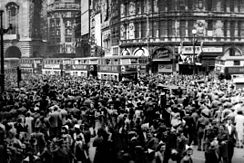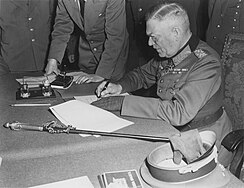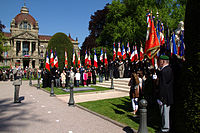Проигрыш в большой войне — не повод стыдливо «забывать» о дне, когда она закончилась: не только выигравшие государства-участники, но и капитулировавшая страна несут огромные человеческие потери, которые должны оставаться в памяти и напоминать новым поколениям о последствиях запредельных лидерских амбиций. В Германии об этом знают хорошо и отмечают 9 мая обязательно — правда, не так, как привыкли праздновать День Победы в СНГ.
Как проводят 9 мая немцы?
Если говорить точно, в европейских государствах День Победы приходится не на 9 мая, а на день раньше, и называется официально Днем освобождения мира от нацизма. Основные причины несовпадения дат таковы:
- Представители Третьего Рейха оставили подписи на Акте о полной капитуляции почти ночью, когда в Советском Союзе фактически настало 9 мая.
- Документ подписывали два раза, поскольку в первый раз процесс не наблюдал маршал Жуков.
Однако часть немцев привыкла праздновать День Победы все-таки 9 мая, потому что эти люди проживали в социалистической ГДР.
8 мая в Германии проходят официальные мероприятия, посвященные памяти воинов Второй мировой войны. В центре Берлина правительство страны и приглашенные люди возлагают венки к мемориалу. На следующий день в Трептов-парк приходят те, кто хочет вспомнить ушедших героев в неофициальной обстановке, и таких людей в Германии насчитывается очень много. 9 мая в памятных мероприятиях участвуют и лица, имеющие отношение к российскому посольству. Было время, когда мемориальный комплекс в Трептов-парке располагался за Берлинской стеной. В связи с этим в объединенном Берлине организовано два места, куда можно возложить букеты и венки в торжественный и памятный день.
Туристам не всегда видно, как в Германии проходит День Победы: на улицах нет гирлянд и флагов, на площадях не собираются десятки тысяч людей, чтобы смотреть на парады, как это происходит в странах постсоветского пространства. Тем не менее, в Берлине праздник отмечается, да и в остальных регионах его помнят все поколения немцев.
День Победы — что это такое для Германии?
По стране не раздаются радостные салюты и не устраиваются зрелищные парады солдат и военной техники, однако память об усопших солдатах жива. 9 мая для каждого коренного немца — не победа в войне, а победа над вероломным режимом, отравившим жизнь миллионам семей Германии на десятилетия вперед. В этом государстве гордятся свержением фашистов и длинной историей антифашистских движений, подрывавших деятельность вставших у власти идейных преступников.
В Берлине и других городах живет немало выходцев из распавшегося Советского Союза, которые уважают День Победы больше «сугубо развлекательных» праздников. Беженцы, эмигранты и их семьи чтут память пострадавших в войне предков и понимают важность перелома, наступившего после 9 мая 1945 года.
Если вас интересует история и культура Германии, немецкий язык, традиции этой страны и общение с живущими в ней людьми, языковая школа dasPROEKT ждет вас на курсах, на заседаниях страноведческого клуба, куда приглашаются бесплатно все студенты, на мероприятиях и дискуссиях.
Этот день в Германии называют Днем освобождения либо Днем памяти. Такое название, а главное, понимание возникло у немцев не сразу
Тысячи людей выйдут 9 мая на улицы Германии в честь праздника. В стране это дни освобождения от нацизма и дни памяти. Акция «Бессмертный полк» пройдет в 20 городах Германии и состоится уже в четвертый раз.
Большая часть официальных мероприятий в эти дни по традиции — в Берлине. И начались они еще 8 мая. В среду, 9 мая, в Берлине состоится премьера фильма Константина Хабенского «Собибор». А что значит этот день для самих немцев и какое оно, 9 Мая в Германии?
9 мая, Берлин — место притяжения русскоязычных со всей Германии. На машинах и автобусах в Трептов-парк (к монументу советского солдата с девочкой на руках) и в Тиргартен — к памятнику у Рейхстага — приедут тысячи людей. В основном выходцы из России, Белоруссии, Казахстана. Официальная делегация с Украины возложила венок 8 мая, как и большинство немецких политиков.
В Германии 8 мая не отмечают, это не государственный праздник, не выходной. Даже о названии спорили долго, а некоторые продолжают до сих пор. В зависимости от федеральной земли это либо называют Днем освобождения, либо Днем памяти. Но в любом случае для немцев этот день не самый простой.
Констанц Линдеманн жительница Берлина
И, пожалуй, это действительно так. Так, например, в праздник в музее «Карлсхорст», где и был подписан акт о капитуляции почти ночью с 8 на 9 мая, немцев довольно много. Но приходят они, скорее, чтобы познакомиться с русской культурой: попробовать борщ, пельмени, квас, водку, шашлык, тархун и березовый сок. Российский День Победы для них типа русского национального праздника и просто развлечение. Иначе как объяснить, что некоторые молодые немцы надевают военную форму тех лет и пытаются петь «Катюшу».
Нина студентка из Регенсбурга
В этом году в музей «Карлсхорст» приехали около трех тысяч человек, и это в обычный будний день! Место славится своей вечерней программой. В зале, где был подписан акт о капитуляции, ровно в 22:43 зажгут свечи и поднимут тост. В этом году музей стал уходить от политики сознательно. Почему?
Йорг Морре директор музея «Карлсхорст» (Берлин)
Сегодня по всей Германии пройдет и «Бессмертный полк» — уже в четвертый раз в 20 городах страны. А в социальные сети выкладывают фотографии машин с наклейками «На Берлин» — только уже с берлинскими номерами. Но обычные немцы на них никак не реагируют, просто не понимают, не могут прочитать кириллицу.
9 мая в Германии состоится премьера фильма «Собибор» о побеге из нацистского концлагеря в Польше. В День Победы режиссер картины Константин Хабенский представит его именно в Берлине, в легендарном Zoo Palast, буквально в 50 метрах от разрушенной бомбежками церкви Кайзера Вильгельма. 4 мая «Собибор» был показан в ООН. Мировая премьера картины состоялась в Варшаве, а закончится турне в День Победы в Берлине.
Добавить BFM.ru в ваши источники новостей?
Как в Германии отмечают победу над фашизмом?
5 Май 2015
Просмотров:
2172

8 мая в 22-43 по центральноевропейскому времени (9 мая в 0-43 по московскому времени) был подписан Акт о безоговорочной капитуляции Германии. Великая Отечественная война закончилась. Из-за отмеченного расхождения в поясном времени, в Европе днем окончания войны считают 8 мая, на день раньше, чем в России.
В этот день по всей Германии проходят памятные мероприятия в честь «Дня освобождения», «Дня освобождения немецкого народа от гитлеровского фашизма», «Дня памяти» — так эта дата именуется в немецких календарях.
Итак, 8 мая, в Германии и во всей Европе отмечают День освобождения от фашистского режима.
День освобождения – не официальная дата. В Германии 8 мая – рабочий день. На государственном уровне этот праздник там не отмечается. Массовыми мероприятиями праздник освобождения от нацизма отмечается лишь в юбилейные годы.
А 9 мая официально звучит как День Европы.
Лишь в России, Украине, Белоруссии и еще в нескольких странах бывшего Советского Союза 9-го мая торжественно отмечают День победы над фашистской Германией. И лишь немногие немцы 9 мая в Берлине возлагают цветы к памятнику неизвестному солдату. Многие жители Германии предпочитают праздновать в неделю с 4 по 11 мая традиционные День отца и День матери.
Но стоит отметить, что отсутствие в немецких календарях официального «красного дня» вовсе не означает пренебрежения к памяти советских воинов, павших в боях на чужбине. Все наши военные захоронения, монументы тех лет и памятные места советской боевой славы, которых в ФРГ отнюдь немало, содержатся в хорошем состоянии.
О войне немцы вспоминают памятными мероприятиями: открываются выставки, выходят новые книги, приводятся неизвестные прежде страницы истории. Возлагаются венки к мемориалам, на кладбищах, где похоронены советские воины. А в церквях по всей стране проходят специальные службы во имя мира и в память о жертвах войны.
В этот день можно почтить память погибших, возложив цветы к монументу Воина-освободителя в берлинском Трептов-парке.
Монумент Воина-освободителя в берлинском Трептов-парке
Скульптор Е. В. Вучетич,
Архитектор Я. Б. Белопольский.
Открыт 8 мая 1949 года.
Высота — 12 метров.
Подразумевается, что меч в руках у солдата является тем же мечом, который рабочий передаёт воину, изображённому на монументе «Тыл — фронту» (Магнитогорск), и который затем поднимает Родина-мать на Мамаевом кургане в Волгограде.
Центром композиции является фигура советского солдата с опущенным мечом и ребенком на руках, стоящим на обломках свастики.
Считается, что прототипом для скульптора послужил советский солдат, уроженец села Вознесенка Тисульского района Кемеровской области, Николай Масалов, спасший немецкую девочку во время штурма Берлина в апреле 1945 года. Но ваял Вучетич воина—освободителя с десантника Ивана Одаренко из Тамбова.
Вам понравилось? Нажмите кнопочку:
Праздник Победы — важное событие для жителей бывшего СССР. В этот день проходят парады и чествуются ветераны Второй мировой. А что делают в этот день жители Германии, как относятся они к этой дате?
8 или 9 мая — празднуют ли в Германии День победы и как к нему относятся
Оговоримся сразу, в Германии отмечают не «День победы», а «День победы над фашистским режимом». При этом дата события не 9 мая, а 8-го. Это связано с разностью во времени между Берлином и Москвой в 2 часа. Ведь акт о капитуляции Германии был подписан по Берлину в 23:01. В Москве в это время уже было час ночи и 9 мая.
Проводятся ли торжества
Сами немцы считают этот день не праздничным, а памятным. Они вспоминают о событии войны без салютов, парадов и пьянств, но с благодарностью за освобождение от фашистского режима.
В Берлине в Трептовер парке установлено огромный мемориал в честь Дня победы. Каждое 9 мая там собираются люди, чтобы возложить к памятникам цветы и посмотреть на вечный огонь и со скорбью вспомнить событие, которое никогда никому не нужно повторять.
From Wikipedia, the free encyclopedia
(Redirected from May 8 1945)
| Victory in Europe Day | |
|---|---|

Winston Churchill waving to the crowds from Whitehall on 8 May celebrating the end of the war, showing the V of Victory. |
|
| Also called |
|
| Observed by |
European states
Full list see below |
| Type | International |
| Significance | End of World War II in Europe |
| Date | 8 May |
| Frequency | Annual |
| First time | 8 May 1945 |
| Related to | Victory over Japan Day, Victory Day (9 May) and Europe Day |
Victory in Europe Day is the day celebrating the formal acceptance by the Allies of World War II of Germany’s unconditional surrender of its armed forces on Tuesday, 8 May 1945, marking the official end of World War II in Europe in the Eastern Front, with the last shots fired on the 11th. Russia and some former Soviet countries celebrate on 9 May. Several countries observe public holidays on the day each year, also called Victory Over Fascism Day, Liberation Day or Victory Day. In the UK it is often abbreviated to VE Day, or V-E Day in the US, a term which existed as early as September 1944,[1] in anticipation of victory.
The end of all combat actions was specified as 23:01 Central European Time, which was already 9 May in eastern Europe, and thus several former Soviet bloc countries including Russia and Belarus, as well as some former Yugoslav countries like Serbia, celebrate Victory Day on 9 May.
History[edit]
Field Marshal Wilhelm Keitel signing the final surrender terms on 8 May 1945 in Berlin
Final positions of the Allied armies, May 1945.
Adolf Hitler, the Nazi leader, had committed suicide on 30 April during the Battle of Berlin, and Germany’s surrender was authorised by his successor, Reichspräsident Karl Dönitz. The administration headed by Dönitz was known as the Flensburg Government. The act of military surrender was first signed at 02:41 on 7 May in SHAEF HQ at Reims,[2] and a slightly modified document, considered the definitive German Instrument of Surrender, was signed on 8 May 1945 in Karlshorst, Berlin at 22:43 local time.
The German High Command will at once issue orders to all German military, naval and air authorities and to all forces under German control to cease active operations at 23.01 hours Central European time on 8 May 1945…
Upon the defeat of Germany, celebrations erupted throughout the Western world, especially in the United Kingdom and in North America. More than one million people celebrated in the streets throughout the UK to mark the end of the European part of the war. In London, crowds massed in Trafalgar Square and up the Mall to Buckingham Palace, where King George VI and Queen Elizabeth, accompanied by their daughters and Prime Minister Winston Churchill, appeared on the balcony of the palace before the cheering crowds. Churchill went from the palace to Whitehall, where he addressed another large crowd:[3]
God bless you all. This is your victory. In our long history, we have never seen a greater day than this. Everyone, man or woman, has done their best.
Celebrations in London on 8 May 1945
Celebrations in Toronto on 8 May 1945
Churchill then asked Ernest Bevin to come forward and share the applause. Bevin said, «No, Winston, this is your day», and proceeded to conduct the people in the singing of «For He’s a Jolly Good Fellow».[3] Later, Princess Elizabeth (the future Queen Elizabeth II) and her sister Princess Margaret were allowed to wander incognito among the crowds and take part in the celebrations.[4] The 2015 film A Royal Night Out was inspired by Elizabeth and Margaret mingling with the public that night.
In the United States, the event coincided with President Harry Truman’s 61st birthday.[5] He dedicated the victory to the memory of his predecessor, Franklin D. Roosevelt, who had died of a cerebral hemorrhage less than a month earlier, on 12 April.[6] Flags remained at half-staff for the remainder of the 30-day mourning period.[7][8] Truman said of dedicating the victory to Roosevelt’s memory and keeping the flags at half-staff that his only wish was «that Franklin D. Roosevelt had lived to witness this day».[6] Later that day, Truman said that the victory made it his most enjoyable birthday.[5] Great celebrations took place in many American cities, especially in New York’s Times Square.[9]
Tempering the jubilation somewhat, both Churchill and Truman pointed out that the war against Japan had not yet been won. In his radio broadcast at 15:00 on 8 May, Churchill told the British people, «We may allow ourselves a brief period of rejoicing (as Japan) remains unsubdued».[10][11] In America, Truman broadcast at 09:00 and said it was «a victory only half won».[12]
National celebrations[edit]
VE Day is celebrated across European nations as public holidays and national observances.
Austria[edit]
The Festival of Joy is an Austrian event held in honor of VE Day. The Austrian Mauthausen Committee (MKÖ) has organised the Festival of Joy since 2013, in cooperation with the Austrian Government and the City of Vienna. The festival is held annually on Heldenplatz.[13]
On the eve of the diamond jubilee in 2020, Russian President Vladimir Putin, at the request of Chancellor Sebastian Kurz, gave a live address broadcast on Austrian TV channel ORF.[14]
France[edit]
France celebrates VE Day on 8 May, being a national and public holiday. Orléans simultaneously celebrates both VE Day and the anniversary of the Siege of Orléans being lifted by French forces led by Joan of Arc during the Hundred Years War on this date.[15]
Germany[edit]
Events in Berlin occur on 8 May to commemorate those who fought against Nazism in the German Resistance and died in World War II. In 2020, a regional holiday in Berlin occurred on 8 May to mark the 75th anniversary of surrender.[16] East Germany celebrated 8 May as its Tag der Befreiung (Day of Liberation), first celebrated under Walter Ulbricht’s government in 1950 and repeated annually until the fall of communism.[17] Between 1975 and 1990, it was Tag des Sieges (Victory Day).[citation needed]
Poland[edit]
8 May is known in Poland as «Narodowy Dzień Zwycięstwa» (National Victory Day). Poland officially recognised 9 May from 1945 until 2014, and on 24 April 2015, Poland officially recognised National Victory Day.[18] On 8 May 1945, a meeting of the Council of Ministers was held, debating whether to establish the holiday on 8 May (proposed by Marshal Michał Rola-Żymierski) or 10 May (proposed by the government).[19] Finally, in Poland, the National Day of Victory and Freedom was established by a decree of 9 May. From 1946 to 1989, it was celebrated with Russian traditions being a socialist state at the time. The main celebrations were carried out at Plac Zwycięstwa or Plac Defilad in Warsaw (most notably in 1985). After 1990, no official ceremonies were organized, however many cities and military units together with local governments organized their own festivities. The Russian minority in Poland continues to celebrate 9 May traditions to this date. At the end of March 2015, due to the upcoming 70th anniversary of the end of World War II in Europe, the President of the Institute of National Remembrance Łukasz Kamiński sent a letter to the Speaker of the Sejm requesting the change from 9 to 8 May.[20] On 24 April, the Sejm adopted the Act on National Victory Day celebrated on 8 May, at the same time abolishing the National Day of Victory and Freedom celebrated on 9 May.[21]
United Kingdom[edit]
In the United Kingdom VE Day is not an annual public holiday. In 1995 and 2020 the bank holiday was moved from the preceding Monday to 8 May to commemorate the 50th and 75th anniversaries of VE Day, respectively.[22][23]
Other commemorative events[edit]
Belgium: In Belgium the commemoration of the termination of World War II since 1974 is part of the Armistice of 11 November 1918 (Dutch: Wapenstilstandsdag), an annual national holiday. Every year on this day there is in presence of the king a truce-ceremony at the Tomb of the Unknown Soldier near the Congress Column in Brussels, at first to commemorate the victims of the First world war and subsequently those of World War II and all other wars worldwide.
Czech Republic: Since the Dissolution of Czechoslovakia in 1993, the Czech Republic has officially recognized 8 May as Victory Day (Den vítězství) Liberation Day (Den osvobození).[24][25] In recent years the liberation of Plzeň by American forces has been commemorated on 5 May.[26][27][28] From 1948 to 1993, the Czechoslovak Republic celebrated 9 May, which was then celebrated with a military parade of the Czechoslovak People’s Army (ČSLA) on Letná every five years.[29][30]
European Union: 9 May is Europe Day which celebrates «peace and unity in Europe», on the anniversary of the 1950 Schuman Declaration.[31]
Baltic states: Estonia, Latvia and Lithuania officially commemorate 8 May, but do not commemorate 9 May since it marked the Soviet occupation for these states.[32] Despite this, the local Russian communities still informally celebrate 9 May. Russian diplomats, other representatives from the Commonwealth of Independent States and the local politicians of Russian origin usually take part.[33][34]
List of associated holidays[edit]
| Country | Holiday name | Date | Type | Notes |
|---|---|---|---|---|
| Victory and Peace Day | 9 May | National public | [35] | |
| Shushi Liberation Day | 8 May | National public | It is celebrated jointly with VE Day | |
| Victory Day | 9 May 2021 | National public | [35] | |
| Liberation Day, Guernsey | 9 May | Regional public | British Channel Islands have three Liberation Days: 9 May in Jersey and Guernsey;[36] 10 May in Sark;[37] and 16 May in Alderney | |
| Liberation Day, Sark | 10 May | Regional public | [37] | |
| Liberation Day, Alderney | 16 May | Regional public | [36] | |
| Victory Day | 9 May | National public | [38] | |
| Victory Day | 9 May | Regional public | Public holiday only in Republika Srpska but celebrated across the nation[39] | |
| Remembrance Day | 8 May | National commemorative | Not a public holiday; commemorative services are held during the day.[40] | |
| Victory over Fascism Day | 9 May | National public | As «ფაშიზმზე გამარჯვების დღე» (Victory over Fascism Day)[41][42] | |
| VE Day | 9 May | National commemorative | Considered a national day of remembrance.[43] | |
| Liberation Day | 25 April | National public | Public holiday.[44] | |
| Liberation Day | 9 May | Regional public | [45] | |
| Victory Day | 9 May | National public | [46] | |
| Victory Day | 9 May | National public | [35] | |
| Remembrance Day | 8 May | National commemorative | As Nacisma sagrāves un Otrā pasaules kara upuru piemiņas diena (The Crushing of Nazism and Commemoration Day of Victims of World War II). Not a public holiday; commemorative services are held during the day.[47] | |
| Remembrance Day | 8 May | National commemorative | As Antrojo pasaulinio karo aukų atminimo diena (Day of Remembrance of the Victims of the World War II).[48] Not a public holiday; commemorative services are held by the President and other officials. | |
| Victory Day and Commemoration of the Fallen Heroes for the Independence of the Fatherland | 9 May | National public | [35][49] | |
| Liberation Day | 5 May | National commemorative | as «Bevrijdingsdag» (Liberation Day), a public holiday held once every year on 5 May.[50] | |
| Liberation Day | 5 May | National commemorative | as «Befrielsesdag» (Liberation Day), an official flag flying day, not a public holiday.[51] | |
| Liberation Day | 8 May | National commemorative | as «Frigjøringsdagen» (Liberation Day) and The National Veterans Day, an official flag flying day, not a public holiday.[52] | |
| Victory Day | 9 May | National public | as «День Победы» (Victory Day)[53][54] | |
| Victory Day | 9 May | National public | as «Дан победе» / «Dan pobede» (Victory Day), a public working holiday.[55][56] | |
| Victory over Fascism Day | 8 May | National public | as «Deň víťazstva nad fašizmom» [57] | |
| Victory Day | 9 May | National public | [35] | |
| Day of Remembrance of National Heroes of Turkmenistan in the 1941–1945 World War | 9 May | National public | [58] | |
| Day of Remembrance and Reconciliation | 8 May | National commemorative | [59] | |
| Victory Day over Nazism in World War II | 9 May | National public | [60] | |
| Day of Remembrance and Honour | 9 May | National public | [61] Known as «День Памяти и Почестей»; before 1999, it was known as «Галаба куни» or «День победы» (Victory Day).[citation needed] |
Soviet Victory Day[edit]
The instrument of surrender signed 7 May 1945 stipulated that all hostilities must cease at 23:01 (CET), 8 May 1945. Since that point in time would be on 9 May in local time in the Soviet Union, most Soviet states including Russia celebrated Victory Day on 9 May.[62][63]
Gallery[edit]
-
-
-
A street in Wetherby with decorative bunting, United Kingdom (2020)
See also[edit]
- Timeline of World War II
- Time of remembrance and reconciliation
- Victory Day
- Victory Day Parades
- Victory over Japan Day
- Stunde Null
Bibliography[edit]
- Hermiston, Roger (2016). All Behind You, Winston – Churchill’s Great Coalition, 1940–45. London: Aurum Press. ISBN 978-17-81316-64-1.
- Telfer, Kevin (2015). The Summer of ’45. Islington: Aurum Press Ltd. ISBN 978-17-81314-35-7.
References[edit]
- ^ Harper, Douglas. «VE Day». Online Etymology Dictionary. Retrieved 12 March 2016.
- ^ Hamilton, Charles (1996). Leaders & Personalities of the Third Reich, Vol. 2. San Jose, CA: R. James Bender Publishing. pp. 285, 286. ISBN 978-0-912138-66-4.
- ^ a b Hermiston 2016, p. 355.
- ^ Barr, Sabrina (8 May 2020). «How Princess Elizabeth celebrated VE Day». The Independent. Archived from the original on 17 August 2022. Retrieved 11 May 2020.
- ^ a b «Truman Marks Birthday». The New York Times. 9 May 1945. p. 6.
- ^ a b «Victory Wreath From Truman Is Laid On Hyde Park Grave of War President». New York Times. Associated Press. 9 May 1945. p. 15.
- ^ «Army Extends Mourning Period». New York Times. Associated Press. 12 May 1945. p. 13.
- ^ United Press (15 May 1945). «30 Days of Mourning For Roosevelt Ended». New York Times. p. 4.
- ^ Telfer 2015, p. 75.
- ^ Telfer 2015, p. 33.
- ^ Hermiston 2016, p. 356.
- ^ Telfer 2015, p. 76.
- ^ «Organizer | Festival of Joy | Day of liberation 8 May». www.festderfreude.at.
- ^ «Putin: Russia grateful to Austria for careful treatment of wartime burial sites». TASS.
- ^ Marine, Protais (8 May 2021). France Bleu Orléans (ed.). «8 mai : le retour de la messe en l’honneur de Jeanne d’Arc à Orléans, malgré les polémiques» (in French). Retrieved 26 May 2021.
{{cite web}}: CS1 maint: url-status (link) - ^ Schereck, Sabine (8 May 2020). «Berlin marks end of WW2 with unprecedented holiday». BBC News. Retrieved 8 May 2020.
- ^ «May 8, 1945: Total defeat or day of liberation? | DW | 5 May 2020». Deutsche Welle (www.dw.com). Retrieved 8 May 2020.
- ^ «Mamy nowe święto państwowe. Po raz pierwszy obchodzimy Narodowy Dzień Zwycięstwa». TVN24.pl. Retrieved 6 May 2019.
- ^ «Jak Moskwa narzuciła nam 9 maja jako Dzień Zwycięstwa i jak świętowaliśmy ten dzień tuż po wojnie | Szczęść Boże Stalinowi – strona 1 – Polityka.pl» (in Polish). www.polityka.pl. 9 May 2015. Retrieved 22 November 2017.
- ^ «Informacja o działalności Instytutu Pamięci Narodowej Komisji Ścigania Zbrodni przeciwko Narodowi Polskiemu w okresie 1 stycznia 2015 r. – 31 grudnia 2015 r., Warszawa 2016, s. 107 i 109» (PDF) (in Polish). Retrieved 7 May 2018.
- ^ «Ustawa z dnia 24 kwietnia 2015 r. o ustanowieniu Narodowego Dnia Zwycięstwa». isap.sejm.gov.pl.
- ^ Bowman, Verity; Hayes, Georgina (8 May 2020). «VE Day 2020: Britons celebrate 75th anniversary of Victory in Europe Day». The Telegraph – via www.telegraph.co.uk.
- ^ «2020 May bank holiday will be moved to mark 75th anniversary of VE Day». GOV.UK. 7 June 2019. Retrieved 8 June 2019.
- ^ «8. květen – Den vítězství | Svátky Centrum.cz». svatky.centrum.cz. Retrieved 7 May 2020.
- ^ «National Holidays in Czech Republic in 2020». Office Holidays. Retrieved 7 May 2020.
- ^ «World War II Liberation Commemorations Culminate in Pilsen| U.S. Embassy in The Czech Republic». U.S. Embassy in The Czech Republic. 7 May 2016. Retrieved 5 May 2020.
- ^ Morning, Prague (5 May 2019). «Czechs Commemorate Anniversary of Prague Uprising». Prague Morning. Retrieved 5 May 2020.
- ^ DK Eyewitness Travel Guide: Czech and Slovak Republics: Czech and Slovak Republics. Penguin. 2013. p. 28. ISBN 978-1-4654-1265-2.
- ^ «Praha zažila vojenskou přehlídku, po 23 letech | Domov». Lidovky.cz (in Czech). 28 October 2008. Retrieved 15 July 2019.
- ^ «Prahou má burácet velkolepá vojenská přehlídka». Novinky.cz. Retrieved 15 July 2019.
- ^ Anonymous (16 June 2016). «Europe Day». European Union. Retrieved 8 May 2020.
- ^ «Baltic ambassadors snub Moscow victory day event». LRT. 10 May 2021. Retrieved 5 May 2022.
- ^ «Thousands mark Soviet Victory Day in Riga». Public Broadcasting of Latvia. 9 May 2015. Retrieved 9 May 2015.
- ^ «Crowds mark Soviet ‘Victory Day’ in Rīga». Public Broadcasting of Latvia. 9 May 2018. Retrieved 9 May 2018.
- ^ a b c d e «Victory Day around the world in 2020». Office Holidays. Retrieved 7 May 2020.
- ^ a b «The History of Liberation Day in Guernsey». www.visitguernsey.com.
- ^ a b «Sark celebrates Liberation Day». ITV News. 10 May 2019.
- ^ «National Holidays, Belarus | Belarus.by». www.belarus.by. Retrieved 7 May 2020.
- ^ «Bosnia and Herzegovina Public Holidays 2019». PublicHolidays.eu. Retrieved 7 May 2020.
- ^ «Statement by the Government of the Republic of Estonia». Government of the Republic of Estonia.
- ^ «9 მაისი, როგორც ფაშიზმზე გამარჯვების დღე, საქართველოშიც აღინიშნა». რადიო თავისუფლება (in Georgian). Retrieved 7 May 2020.
- ^ «National Holidays in Georgia in 2020». Office Holidays. Retrieved 7 May 2020.
- ^ «Knesset Creates Victory in Europe Day». Knesset. Retrieved 12 May 2019.
- ^ «Governo Italiano — Dipartimento per il Cerimoniale dello Stato». Italian Government. Retrieved 10 May 2021.
- ^ Jersey, States of. «Government of Jersey». gov.je.
- ^ «National Holidays in Kazakhstan in 2020». Office Holidays. Retrieved 7 May 2020.
- ^ «Latvia’s National holidays and Remembrance days — MFA of Latvia». www.mfa.gov.lv. Archived from the original on 17 November 2016.
- ^ «Memorable dates and anniversaries — Genocid.lt».
- ^ «Europe Day around the world in 2020». Office Holidays. Retrieved 8 May 2020.
- ^ Bevrijdingsdag 5 mei in (in Dutch)
- ^ Befrielsendanmarkshistorien.dk in (in Danish)
- ^ Frigjøringen Store norske leksikon in (in Norwegian)
- ^ «National Holidays in Russia in 2020». Office Holidays. Retrieved 7 May 2020.
- ^ «Победа! 75 лет – официальный сайт». www.may9.ru. Retrieved 7 May 2020.
- ^ «Europe Day in Serbia in 2020». Office Holidays. Retrieved 7 May 2020.
- ^ «National and religious holidays in Serbia» (in Serbian). Retrieved 30 April 2022.
- ^ «National Holidays in Slovakia in 2020». Office Holidays. Retrieved 7 May 2020.
- ^ «TURKMENISTAN MARKS DAY OF REMEMBRANCE OF THE FALLEN IN WORLD WAR II | Turkmenistan.ru». www.turkmenistan.ru.
- ^ «Day of Remembrance and Reconciliation in Ukraine in 2020». Office Holidays. Retrieved 7 May 2020.
- ^ «Victory Day (in lieu) in Ukraine in 2020». Office Holidays. Retrieved 7 May 2020.
- ^ «Memorial Day in Uzbekistan in 2020». Office Holidays. Retrieved 8 May 2020.
- ^ Earl F. Ziemke, 1990, Washington DC, CENTER OF MILITARY HISTORY, CHAPTER XV:The Victory Sealed Page 258 last 2 paragraphs
- ^ Parfitt, Tom (9 May 2015). «Russia’s Victory Day Parade marks new East-West divide». The Daily Telegraph. Retrieved 9 May 2016.
External links[edit]
Media related to VE Day at Wikimedia Commons
- Records from the UK Parliament Collections
- WWII: VE Day, May 8, 1945 – slideshow by Life magazine (archived)
- Rare audio speeches of the famous historical persons of the USSR, etc.
- 50th Anniversary Celebration of VE Day in Moscow on YouTube by Leon Charney on The Leon Charney Report.
From Wikipedia, the free encyclopedia
(Redirected from May 8 1945)
| Victory in Europe Day | |
|---|---|

Winston Churchill waving to the crowds from Whitehall on 8 May celebrating the end of the war, showing the V of Victory. |
|
| Also called |
|
| Observed by |
European states
Full list see below |
| Type | International |
| Significance | End of World War II in Europe |
| Date | 8 May |
| Frequency | Annual |
| First time | 8 May 1945 |
| Related to | Victory over Japan Day, Victory Day (9 May) and Europe Day |
Victory in Europe Day is the day celebrating the formal acceptance by the Allies of World War II of Germany’s unconditional surrender of its armed forces on Tuesday, 8 May 1945, marking the official end of World War II in Europe in the Eastern Front, with the last shots fired on the 11th. Russia and some former Soviet countries celebrate on 9 May. Several countries observe public holidays on the day each year, also called Victory Over Fascism Day, Liberation Day or Victory Day. In the UK it is often abbreviated to VE Day, or V-E Day in the US, a term which existed as early as September 1944,[1] in anticipation of victory.
The end of all combat actions was specified as 23:01 Central European Time, which was already 9 May in eastern Europe, and thus several former Soviet bloc countries including Russia and Belarus, as well as some former Yugoslav countries like Serbia, celebrate Victory Day on 9 May.
History[edit]
Field Marshal Wilhelm Keitel signing the final surrender terms on 8 May 1945 in Berlin
Final positions of the Allied armies, May 1945.
Adolf Hitler, the Nazi leader, had committed suicide on 30 April during the Battle of Berlin, and Germany’s surrender was authorised by his successor, Reichspräsident Karl Dönitz. The administration headed by Dönitz was known as the Flensburg Government. The act of military surrender was first signed at 02:41 on 7 May in SHAEF HQ at Reims,[2] and a slightly modified document, considered the definitive German Instrument of Surrender, was signed on 8 May 1945 in Karlshorst, Berlin at 22:43 local time.
The German High Command will at once issue orders to all German military, naval and air authorities and to all forces under German control to cease active operations at 23.01 hours Central European time on 8 May 1945…
Upon the defeat of Germany, celebrations erupted throughout the Western world, especially in the United Kingdom and in North America. More than one million people celebrated in the streets throughout the UK to mark the end of the European part of the war. In London, crowds massed in Trafalgar Square and up the Mall to Buckingham Palace, where King George VI and Queen Elizabeth, accompanied by their daughters and Prime Minister Winston Churchill, appeared on the balcony of the palace before the cheering crowds. Churchill went from the palace to Whitehall, where he addressed another large crowd:[3]
God bless you all. This is your victory. In our long history, we have never seen a greater day than this. Everyone, man or woman, has done their best.
Celebrations in London on 8 May 1945
Celebrations in Toronto on 8 May 1945
Churchill then asked Ernest Bevin to come forward and share the applause. Bevin said, «No, Winston, this is your day», and proceeded to conduct the people in the singing of «For He’s a Jolly Good Fellow».[3] Later, Princess Elizabeth (the future Queen Elizabeth II) and her sister Princess Margaret were allowed to wander incognito among the crowds and take part in the celebrations.[4] The 2015 film A Royal Night Out was inspired by Elizabeth and Margaret mingling with the public that night.
In the United States, the event coincided with President Harry Truman’s 61st birthday.[5] He dedicated the victory to the memory of his predecessor, Franklin D. Roosevelt, who had died of a cerebral hemorrhage less than a month earlier, on 12 April.[6] Flags remained at half-staff for the remainder of the 30-day mourning period.[7][8] Truman said of dedicating the victory to Roosevelt’s memory and keeping the flags at half-staff that his only wish was «that Franklin D. Roosevelt had lived to witness this day».[6] Later that day, Truman said that the victory made it his most enjoyable birthday.[5] Great celebrations took place in many American cities, especially in New York’s Times Square.[9]
Tempering the jubilation somewhat, both Churchill and Truman pointed out that the war against Japan had not yet been won. In his radio broadcast at 15:00 on 8 May, Churchill told the British people, «We may allow ourselves a brief period of rejoicing (as Japan) remains unsubdued».[10][11] In America, Truman broadcast at 09:00 and said it was «a victory only half won».[12]
National celebrations[edit]
VE Day is celebrated across European nations as public holidays and national observances.
Austria[edit]
The Festival of Joy is an Austrian event held in honor of VE Day. The Austrian Mauthausen Committee (MKÖ) has organised the Festival of Joy since 2013, in cooperation with the Austrian Government and the City of Vienna. The festival is held annually on Heldenplatz.[13]
On the eve of the diamond jubilee in 2020, Russian President Vladimir Putin, at the request of Chancellor Sebastian Kurz, gave a live address broadcast on Austrian TV channel ORF.[14]
France[edit]
France celebrates VE Day on 8 May, being a national and public holiday. Orléans simultaneously celebrates both VE Day and the anniversary of the Siege of Orléans being lifted by French forces led by Joan of Arc during the Hundred Years War on this date.[15]
Germany[edit]
Events in Berlin occur on 8 May to commemorate those who fought against Nazism in the German Resistance and died in World War II. In 2020, a regional holiday in Berlin occurred on 8 May to mark the 75th anniversary of surrender.[16] East Germany celebrated 8 May as its Tag der Befreiung (Day of Liberation), first celebrated under Walter Ulbricht’s government in 1950 and repeated annually until the fall of communism.[17] Between 1975 and 1990, it was Tag des Sieges (Victory Day).[citation needed]
Poland[edit]
8 May is known in Poland as «Narodowy Dzień Zwycięstwa» (National Victory Day). Poland officially recognised 9 May from 1945 until 2014, and on 24 April 2015, Poland officially recognised National Victory Day.[18] On 8 May 1945, a meeting of the Council of Ministers was held, debating whether to establish the holiday on 8 May (proposed by Marshal Michał Rola-Żymierski) or 10 May (proposed by the government).[19] Finally, in Poland, the National Day of Victory and Freedom was established by a decree of 9 May. From 1946 to 1989, it was celebrated with Russian traditions being a socialist state at the time. The main celebrations were carried out at Plac Zwycięstwa or Plac Defilad in Warsaw (most notably in 1985). After 1990, no official ceremonies were organized, however many cities and military units together with local governments organized their own festivities. The Russian minority in Poland continues to celebrate 9 May traditions to this date. At the end of March 2015, due to the upcoming 70th anniversary of the end of World War II in Europe, the President of the Institute of National Remembrance Łukasz Kamiński sent a letter to the Speaker of the Sejm requesting the change from 9 to 8 May.[20] On 24 April, the Sejm adopted the Act on National Victory Day celebrated on 8 May, at the same time abolishing the National Day of Victory and Freedom celebrated on 9 May.[21]
United Kingdom[edit]
In the United Kingdom VE Day is not an annual public holiday. In 1995 and 2020 the bank holiday was moved from the preceding Monday to 8 May to commemorate the 50th and 75th anniversaries of VE Day, respectively.[22][23]
Other commemorative events[edit]
Belgium: In Belgium the commemoration of the termination of World War II since 1974 is part of the Armistice of 11 November 1918 (Dutch: Wapenstilstandsdag), an annual national holiday. Every year on this day there is in presence of the king a truce-ceremony at the Tomb of the Unknown Soldier near the Congress Column in Brussels, at first to commemorate the victims of the First world war and subsequently those of World War II and all other wars worldwide.
Czech Republic: Since the Dissolution of Czechoslovakia in 1993, the Czech Republic has officially recognized 8 May as Victory Day (Den vítězství) Liberation Day (Den osvobození).[24][25] In recent years the liberation of Plzeň by American forces has been commemorated on 5 May.[26][27][28] From 1948 to 1993, the Czechoslovak Republic celebrated 9 May, which was then celebrated with a military parade of the Czechoslovak People’s Army (ČSLA) on Letná every five years.[29][30]
European Union: 9 May is Europe Day which celebrates «peace and unity in Europe», on the anniversary of the 1950 Schuman Declaration.[31]
Baltic states: Estonia, Latvia and Lithuania officially commemorate 8 May, but do not commemorate 9 May since it marked the Soviet occupation for these states.[32] Despite this, the local Russian communities still informally celebrate 9 May. Russian diplomats, other representatives from the Commonwealth of Independent States and the local politicians of Russian origin usually take part.[33][34]
List of associated holidays[edit]
| Country | Holiday name | Date | Type | Notes |
|---|---|---|---|---|
| Victory and Peace Day | 9 May | National public | [35] | |
| Shushi Liberation Day | 8 May | National public | It is celebrated jointly with VE Day | |
| Victory Day | 9 May 2021 | National public | [35] | |
| Liberation Day, Guernsey | 9 May | Regional public | British Channel Islands have three Liberation Days: 9 May in Jersey and Guernsey;[36] 10 May in Sark;[37] and 16 May in Alderney | |
| Liberation Day, Sark | 10 May | Regional public | [37] | |
| Liberation Day, Alderney | 16 May | Regional public | [36] | |
| Victory Day | 9 May | National public | [38] | |
| Victory Day | 9 May | Regional public | Public holiday only in Republika Srpska but celebrated across the nation[39] | |
| Remembrance Day | 8 May | National commemorative | Not a public holiday; commemorative services are held during the day.[40] | |
| Victory over Fascism Day | 9 May | National public | As «ფაშიზმზე გამარჯვების დღე» (Victory over Fascism Day)[41][42] | |
| VE Day | 9 May | National commemorative | Considered a national day of remembrance.[43] | |
| Liberation Day | 25 April | National public | Public holiday.[44] | |
| Liberation Day | 9 May | Regional public | [45] | |
| Victory Day | 9 May | National public | [46] | |
| Victory Day | 9 May | National public | [35] | |
| Remembrance Day | 8 May | National commemorative | As Nacisma sagrāves un Otrā pasaules kara upuru piemiņas diena (The Crushing of Nazism and Commemoration Day of Victims of World War II). Not a public holiday; commemorative services are held during the day.[47] | |
| Remembrance Day | 8 May | National commemorative | As Antrojo pasaulinio karo aukų atminimo diena (Day of Remembrance of the Victims of the World War II).[48] Not a public holiday; commemorative services are held by the President and other officials. | |
| Victory Day and Commemoration of the Fallen Heroes for the Independence of the Fatherland | 9 May | National public | [35][49] | |
| Liberation Day | 5 May | National commemorative | as «Bevrijdingsdag» (Liberation Day), a public holiday held once every year on 5 May.[50] | |
| Liberation Day | 5 May | National commemorative | as «Befrielsesdag» (Liberation Day), an official flag flying day, not a public holiday.[51] | |
| Liberation Day | 8 May | National commemorative | as «Frigjøringsdagen» (Liberation Day) and The National Veterans Day, an official flag flying day, not a public holiday.[52] | |
| Victory Day | 9 May | National public | as «День Победы» (Victory Day)[53][54] | |
| Victory Day | 9 May | National public | as «Дан победе» / «Dan pobede» (Victory Day), a public working holiday.[55][56] | |
| Victory over Fascism Day | 8 May | National public | as «Deň víťazstva nad fašizmom» [57] | |
| Victory Day | 9 May | National public | [35] | |
| Day of Remembrance of National Heroes of Turkmenistan in the 1941–1945 World War | 9 May | National public | [58] | |
| Day of Remembrance and Reconciliation | 8 May | National commemorative | [59] | |
| Victory Day over Nazism in World War II | 9 May | National public | [60] | |
| Day of Remembrance and Honour | 9 May | National public | [61] Known as «День Памяти и Почестей»; before 1999, it was known as «Галаба куни» or «День победы» (Victory Day).[citation needed] |
Soviet Victory Day[edit]
The instrument of surrender signed 7 May 1945 stipulated that all hostilities must cease at 23:01 (CET), 8 May 1945. Since that point in time would be on 9 May in local time in the Soviet Union, most Soviet states including Russia celebrated Victory Day on 9 May.[62][63]
Gallery[edit]
-
-
-
A street in Wetherby with decorative bunting, United Kingdom (2020)
See also[edit]
- Timeline of World War II
- Time of remembrance and reconciliation
- Victory Day
- Victory Day Parades
- Victory over Japan Day
- Stunde Null
Bibliography[edit]
- Hermiston, Roger (2016). All Behind You, Winston – Churchill’s Great Coalition, 1940–45. London: Aurum Press. ISBN 978-17-81316-64-1.
- Telfer, Kevin (2015). The Summer of ’45. Islington: Aurum Press Ltd. ISBN 978-17-81314-35-7.
References[edit]
- ^ Harper, Douglas. «VE Day». Online Etymology Dictionary. Retrieved 12 March 2016.
- ^ Hamilton, Charles (1996). Leaders & Personalities of the Third Reich, Vol. 2. San Jose, CA: R. James Bender Publishing. pp. 285, 286. ISBN 978-0-912138-66-4.
- ^ a b Hermiston 2016, p. 355.
- ^ Barr, Sabrina (8 May 2020). «How Princess Elizabeth celebrated VE Day». The Independent. Archived from the original on 17 August 2022. Retrieved 11 May 2020.
- ^ a b «Truman Marks Birthday». The New York Times. 9 May 1945. p. 6.
- ^ a b «Victory Wreath From Truman Is Laid On Hyde Park Grave of War President». New York Times. Associated Press. 9 May 1945. p. 15.
- ^ «Army Extends Mourning Period». New York Times. Associated Press. 12 May 1945. p. 13.
- ^ United Press (15 May 1945). «30 Days of Mourning For Roosevelt Ended». New York Times. p. 4.
- ^ Telfer 2015, p. 75.
- ^ Telfer 2015, p. 33.
- ^ Hermiston 2016, p. 356.
- ^ Telfer 2015, p. 76.
- ^ «Organizer | Festival of Joy | Day of liberation 8 May». www.festderfreude.at.
- ^ «Putin: Russia grateful to Austria for careful treatment of wartime burial sites». TASS.
- ^ Marine, Protais (8 May 2021). France Bleu Orléans (ed.). «8 mai : le retour de la messe en l’honneur de Jeanne d’Arc à Orléans, malgré les polémiques» (in French). Retrieved 26 May 2021.
{{cite web}}: CS1 maint: url-status (link) - ^ Schereck, Sabine (8 May 2020). «Berlin marks end of WW2 with unprecedented holiday». BBC News. Retrieved 8 May 2020.
- ^ «May 8, 1945: Total defeat or day of liberation? | DW | 5 May 2020». Deutsche Welle (www.dw.com). Retrieved 8 May 2020.
- ^ «Mamy nowe święto państwowe. Po raz pierwszy obchodzimy Narodowy Dzień Zwycięstwa». TVN24.pl. Retrieved 6 May 2019.
- ^ «Jak Moskwa narzuciła nam 9 maja jako Dzień Zwycięstwa i jak świętowaliśmy ten dzień tuż po wojnie | Szczęść Boże Stalinowi – strona 1 – Polityka.pl» (in Polish). www.polityka.pl. 9 May 2015. Retrieved 22 November 2017.
- ^ «Informacja o działalności Instytutu Pamięci Narodowej Komisji Ścigania Zbrodni przeciwko Narodowi Polskiemu w okresie 1 stycznia 2015 r. – 31 grudnia 2015 r., Warszawa 2016, s. 107 i 109» (PDF) (in Polish). Retrieved 7 May 2018.
- ^ «Ustawa z dnia 24 kwietnia 2015 r. o ustanowieniu Narodowego Dnia Zwycięstwa». isap.sejm.gov.pl.
- ^ Bowman, Verity; Hayes, Georgina (8 May 2020). «VE Day 2020: Britons celebrate 75th anniversary of Victory in Europe Day». The Telegraph – via www.telegraph.co.uk.
- ^ «2020 May bank holiday will be moved to mark 75th anniversary of VE Day». GOV.UK. 7 June 2019. Retrieved 8 June 2019.
- ^ «8. květen – Den vítězství | Svátky Centrum.cz». svatky.centrum.cz. Retrieved 7 May 2020.
- ^ «National Holidays in Czech Republic in 2020». Office Holidays. Retrieved 7 May 2020.
- ^ «World War II Liberation Commemorations Culminate in Pilsen| U.S. Embassy in The Czech Republic». U.S. Embassy in The Czech Republic. 7 May 2016. Retrieved 5 May 2020.
- ^ Morning, Prague (5 May 2019). «Czechs Commemorate Anniversary of Prague Uprising». Prague Morning. Retrieved 5 May 2020.
- ^ DK Eyewitness Travel Guide: Czech and Slovak Republics: Czech and Slovak Republics. Penguin. 2013. p. 28. ISBN 978-1-4654-1265-2.
- ^ «Praha zažila vojenskou přehlídku, po 23 letech | Domov». Lidovky.cz (in Czech). 28 October 2008. Retrieved 15 July 2019.
- ^ «Prahou má burácet velkolepá vojenská přehlídka». Novinky.cz. Retrieved 15 July 2019.
- ^ Anonymous (16 June 2016). «Europe Day». European Union. Retrieved 8 May 2020.
- ^ «Baltic ambassadors snub Moscow victory day event». LRT. 10 May 2021. Retrieved 5 May 2022.
- ^ «Thousands mark Soviet Victory Day in Riga». Public Broadcasting of Latvia. 9 May 2015. Retrieved 9 May 2015.
- ^ «Crowds mark Soviet ‘Victory Day’ in Rīga». Public Broadcasting of Latvia. 9 May 2018. Retrieved 9 May 2018.
- ^ a b c d e «Victory Day around the world in 2020». Office Holidays. Retrieved 7 May 2020.
- ^ a b «The History of Liberation Day in Guernsey». www.visitguernsey.com.
- ^ a b «Sark celebrates Liberation Day». ITV News. 10 May 2019.
- ^ «National Holidays, Belarus | Belarus.by». www.belarus.by. Retrieved 7 May 2020.
- ^ «Bosnia and Herzegovina Public Holidays 2019». PublicHolidays.eu. Retrieved 7 May 2020.
- ^ «Statement by the Government of the Republic of Estonia». Government of the Republic of Estonia.
- ^ «9 მაისი, როგორც ფაშიზმზე გამარჯვების დღე, საქართველოშიც აღინიშნა». რადიო თავისუფლება (in Georgian). Retrieved 7 May 2020.
- ^ «National Holidays in Georgia in 2020». Office Holidays. Retrieved 7 May 2020.
- ^ «Knesset Creates Victory in Europe Day». Knesset. Retrieved 12 May 2019.
- ^ «Governo Italiano — Dipartimento per il Cerimoniale dello Stato». Italian Government. Retrieved 10 May 2021.
- ^ Jersey, States of. «Government of Jersey». gov.je.
- ^ «National Holidays in Kazakhstan in 2020». Office Holidays. Retrieved 7 May 2020.
- ^ «Latvia’s National holidays and Remembrance days — MFA of Latvia». www.mfa.gov.lv. Archived from the original on 17 November 2016.
- ^ «Memorable dates and anniversaries — Genocid.lt».
- ^ «Europe Day around the world in 2020». Office Holidays. Retrieved 8 May 2020.
- ^ Bevrijdingsdag 5 mei in (in Dutch)
- ^ Befrielsendanmarkshistorien.dk in (in Danish)
- ^ Frigjøringen Store norske leksikon in (in Norwegian)
- ^ «National Holidays in Russia in 2020». Office Holidays. Retrieved 7 May 2020.
- ^ «Победа! 75 лет – официальный сайт». www.may9.ru. Retrieved 7 May 2020.
- ^ «Europe Day in Serbia in 2020». Office Holidays. Retrieved 7 May 2020.
- ^ «National and religious holidays in Serbia» (in Serbian). Retrieved 30 April 2022.
- ^ «National Holidays in Slovakia in 2020». Office Holidays. Retrieved 7 May 2020.
- ^ «TURKMENISTAN MARKS DAY OF REMEMBRANCE OF THE FALLEN IN WORLD WAR II | Turkmenistan.ru». www.turkmenistan.ru.
- ^ «Day of Remembrance and Reconciliation in Ukraine in 2020». Office Holidays. Retrieved 7 May 2020.
- ^ «Victory Day (in lieu) in Ukraine in 2020». Office Holidays. Retrieved 7 May 2020.
- ^ «Memorial Day in Uzbekistan in 2020». Office Holidays. Retrieved 8 May 2020.
- ^ Earl F. Ziemke, 1990, Washington DC, CENTER OF MILITARY HISTORY, CHAPTER XV:The Victory Sealed Page 258 last 2 paragraphs
- ^ Parfitt, Tom (9 May 2015). «Russia’s Victory Day Parade marks new East-West divide». The Daily Telegraph. Retrieved 9 May 2016.
External links[edit]
Media related to VE Day at Wikimedia Commons
- Records from the UK Parliament Collections
- WWII: VE Day, May 8, 1945 – slideshow by Life magazine (archived)
- Rare audio speeches of the famous historical persons of the USSR, etc.
- 50th Anniversary Celebration of VE Day in Moscow on YouTube by Leon Charney on The Leon Charney Report.
День Победы – один из самых главных праздников нашей страны, его отмечают с грандиозными салютами и парадами, воздух наполнен атмосферой торжества и героизма. Праздник, посвященный 9 мая, проходит и в Германии. Но торжества в этот день сильно отличаются от привычных для нас.
День Победы – один из самых главных праздников нашей страны, его отмечают с грандиозными салютами и парадами, воздух наполнен атмосферой торжества и героизма. Праздник, посвященный 9 мая, проходит и в Германии. Но торжества в этот день сильно отличаются от привычных для нас.
Проведение праздника 9 мая в Германии
В Европе День Победы называют Днем освобождения от нацизма и отмечают его 8 мая. Существует несколько вариантов объяснения такой разницы в датах:
- Акт о полной капитуляции Третьего Рейха был подписан поздно вечером, когда в России уже наступило 9 мая.
- Акт был подписан дважды, так как при первой церемонии не присутствовал маршал Жуков.
Но 9 мая осталось для многих немцев праздником, который они привыкли отмечать именно как День Победы. Причина тому – годы жизни в социалистической ГДР. Официальная часть торжества проходит 8-го мая, в центе Берлина, в районе Тиргартен, первые лица страны возлагают цветы к мемориальному памятнику.
Германия празднует 9 мая довольно тихо, сотни немцев приходят почтить память павших героев и положить цветы на мемориал советским солдатам в Трептов-парк. В этих торжествах также участвуют представители российского посольства. Когда-то этот мемориал находился за Берлинской стеной, поэтому в городе существует два места, куда несут цветы на День Победы, по одному в каждой части города.
Приезжим бывает сложно понять, как Германия отмечает 9 мая. Ведь улицы не увешаны флажками, нет многотысячных митингов и парадов. В основном все праздничные мероприятия проходят в Берлине, но все же этот праздник существует, о нем не забывают уже несколько поколений немцев.
Что означает 9 мая для немцев?
В Германии не звучат салюты и не проводятся военные парады, но люди помнят этот день и чтят память погибших героев. Для многих это может показаться странным, так как мы привыкли воспринимать 9 мая как день победы над Германией. Но для немцев есть свой повод для праздника. 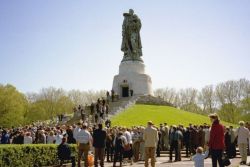
Кроме того, в Германии проживает много выходцев из бывшего СССР, для которых День Победы – один из самых важных дней в году. Они не забывают свою историю и ежегодно приходят почтить память павших героев.
Для немцев 8 и 9 мая – это переломные дни в истории. Победа над нацизмом не менее важна для Германии, чем для остальных европейских стран.
Статьи по теме:

Этот день имеет глубокую историю, происходящую еще во времен Древней Греции, и имеет огромное значение в жизни каждого человека. Все о Дне матери мы расскажем в статье. |
Все мы ежегодно отмечаем праздник 1 мая на природе с костром и веселыми играми, а многие ли знают, как называется этот праздник и каково его происхождение? Об этом мы расскажем в нашей статье. |

Самой большой ценностью в жизни человека является, конечно же, семья, и такой праздник, как День семьи – еще один повод провести время в кругу родных и близких. Об истории этого прекрасного праздника мы расскажем в статье. |

С развитием новых технологий и коммуникаций люди стали постепенно забывать о бесценном кладезе знаний, находящемся в библиотеках. Именно о важности библиотек в жизни каждого человека и призван рассказать Всемирный день библиотек. |






